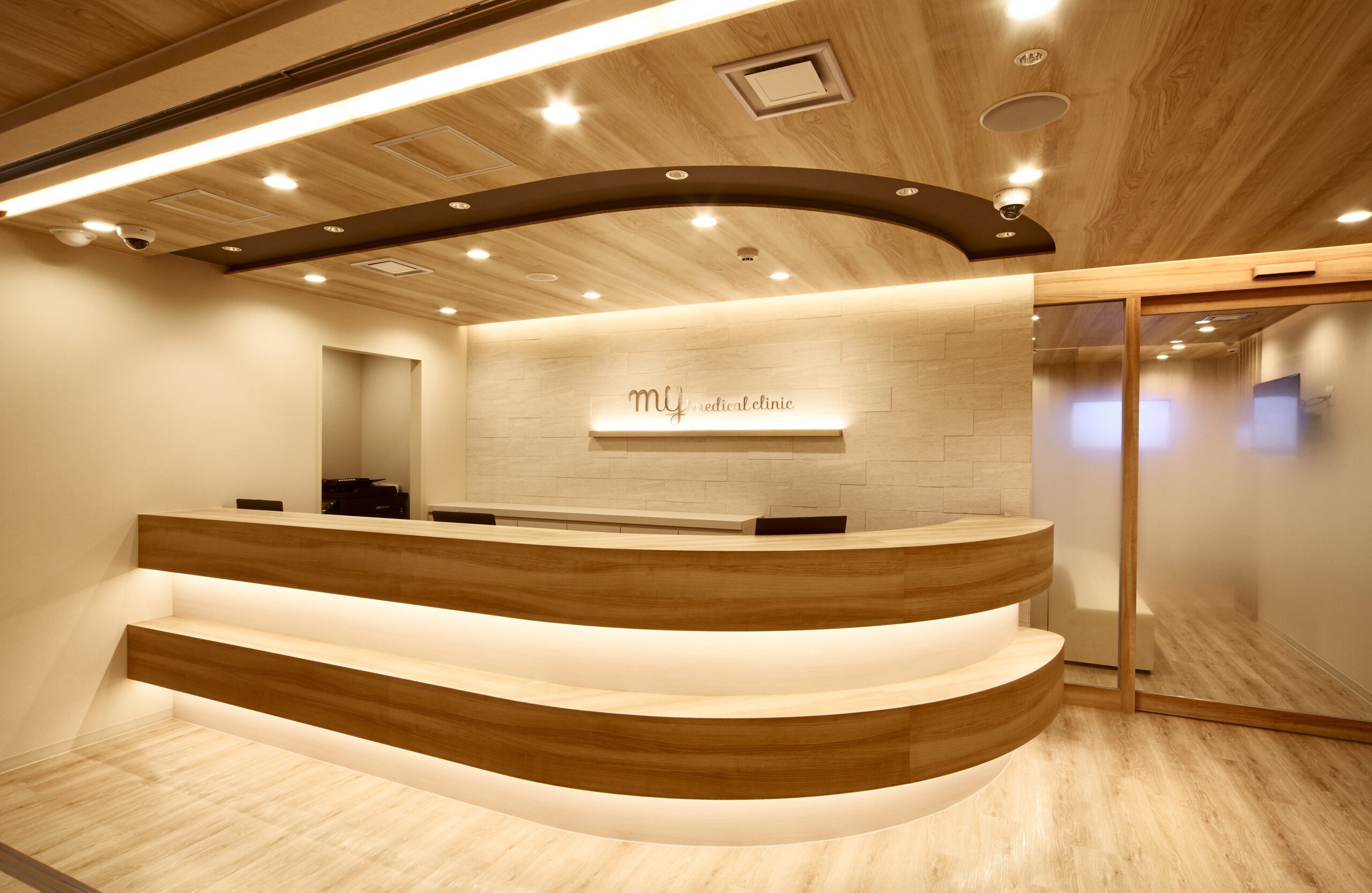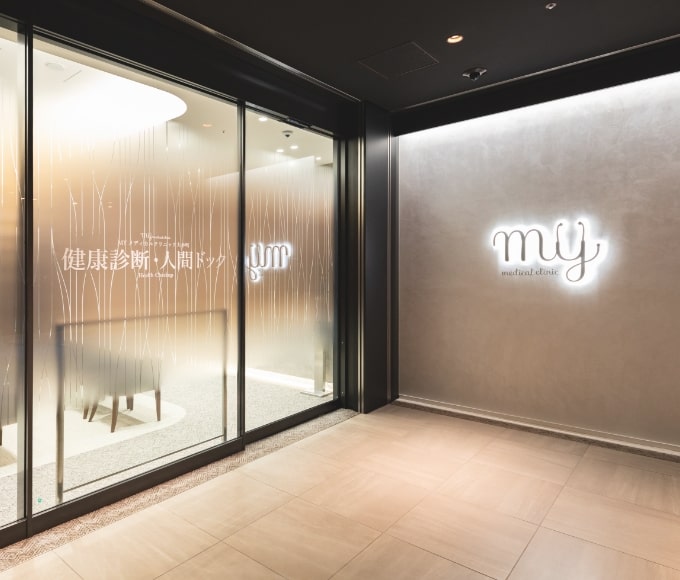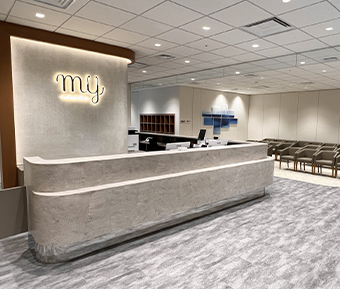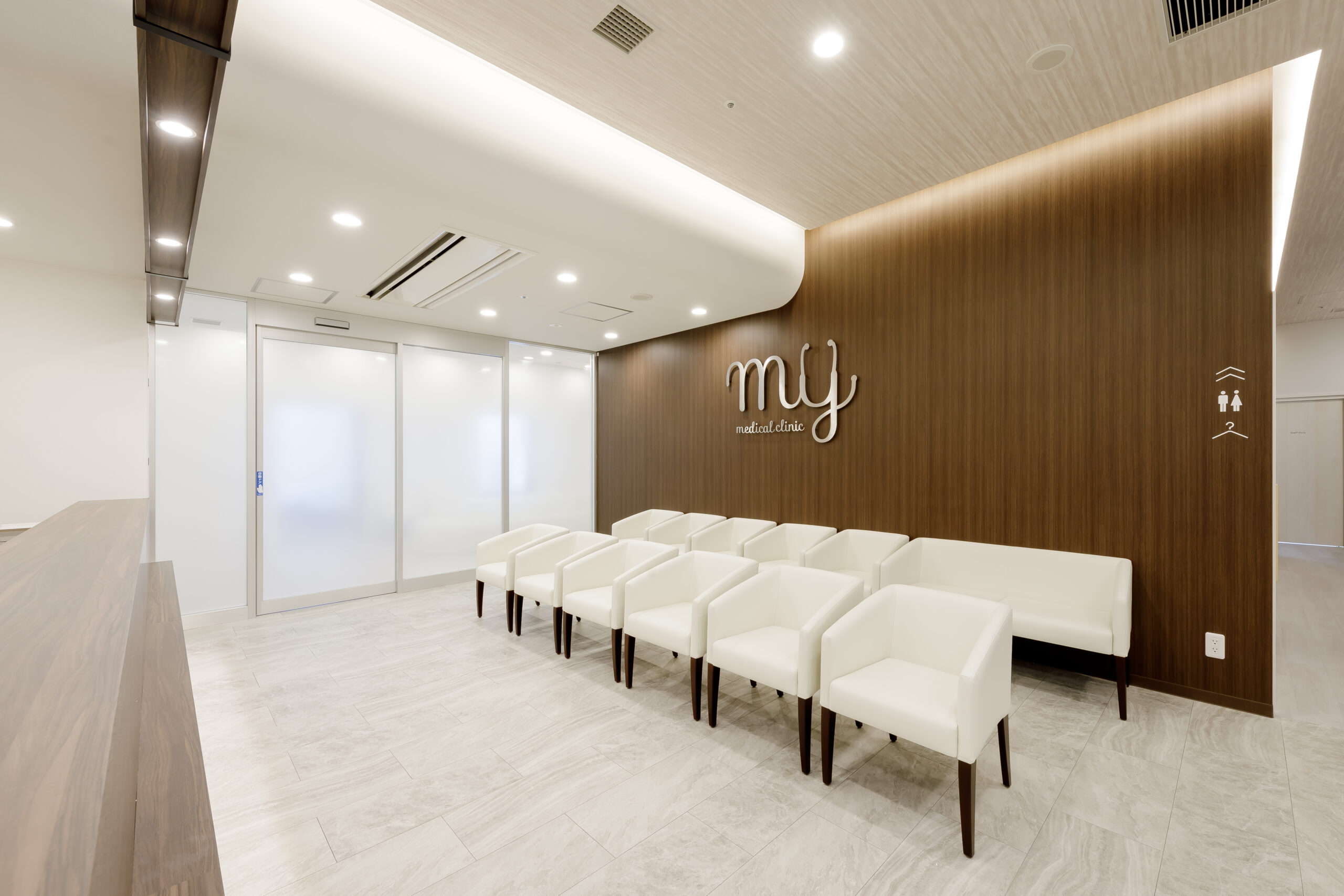
Points to note before your health examination
TABLE OF CONTENTS
- About the pre-examination instructions
- Points to note before a health examination or complete health examination
- For patients who will receive blood tests
- For patients who will receive gastric X-rays
- For patients who will receive gastroscopy
- For patients who will receive colonoscopy
- For patients who will receive cervical cytology
- For patients who will receive mammography
About the pre-examination instructions
- 1. The pre-examination instructions are sent out approximately 1 month before the date of the appointment.
If your appointment was made via a corporation or health insurance association and the address we have for you is incorrect, the pre-examination instructions may be returned to us undelivered.
If you have not received the pre-examination instructions 1 week prior to the scheduled visit date, please call the clinic where you have the appointment for confirmation. - 2. If the pre-examination instructions and test kit that were sent to you become lost, you will need to either come to the clinic to pick up a new set or fill out the questionnaire and provide your urine or stool sample on the day of your health examination.
You can have the pre-examination instructions sent to your home again for a fee of 2,200 yen (tax included).
If you wish to request this, please call the clinic where you have an appointment.
Reception hours: Weekdays 9:00~17:00
| MY Medical Clinic Shibuya | 03-4213-721903-4213-7219 |
|---|---|
| MY Medical Clinic Otemachi | 03-4213-726503-4213-7265 |
| MY Medical Clinic Yokohama Minatomirai | 03-4213-723503-4213-7235 |
Points to note before a health examination or complete health examination
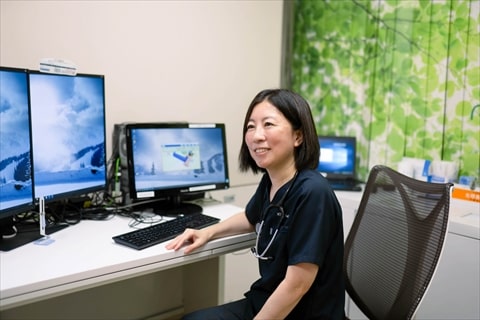
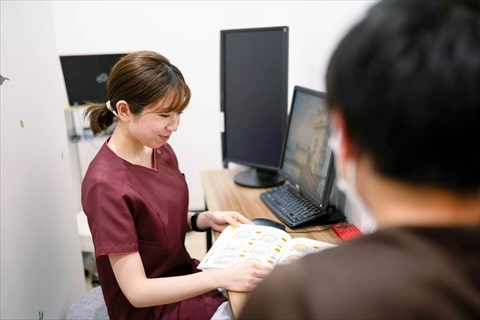
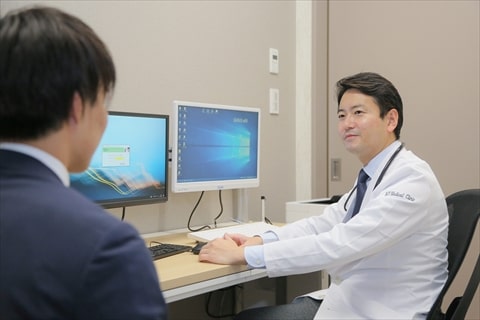
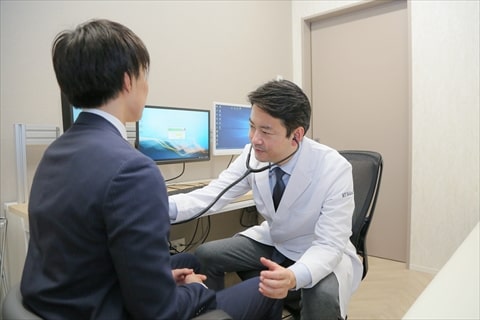
- If your test items include a blood test, you will be asked to refrain from eating for 10 hours before the test.
You can drink about a cup of water or green tea on the day of the test, but please note that you must even refrain from eating hard candy, chewing on gum, or drinking coffee or tea containing sugar or milk. - If your test items include abdominal ultrasonography, gastric X-ray, or gastroscopy, you will be asked to refrain from eating for 7 hours before the test.
If less than 7 hours have passed since your last meal, the test may be cancelled because of the influence of food residue.
* Please read the specific precautions for gastric X-ray and gastroscopy below. - If you are to receive a urea breath test, you will be asked to refrain from eating for 4 hours before the test.
You can drink about 1 cup of water, but please note that you must even refrain from eating hard candy or chewing on gum, etc.
Also, please refrain from smoking until the test is completed. - If you wish to cancel the gastric X-ray at your own convenience, please call the clinic where you have an appointment when you receive the pre-examination instructions.
MY Medical
Clinic Shibuya03-4213-721903-4213-7219 MY Medical
Clinic Otemachi03-4213-726503-4213-7265 MY Medical Clinic Yokohama Minatomirai 03-4213-723503-4213-7235 - If your test items include a fundus test or intraocular pressure test and you wear contact lenses (including color contact lenses and circle lenses), please bring the contact lens case and lens care solution with you.
If you forgot to bring them on the day of the test or you cannot remove your contact lenses, you may not be able to receive the test. - If you need to cancel on the day of the examination because you are not feeling well, please contact the clinic where you have an appointment.
Please note that your appointment will be cancelled if you arrive more than 30 minutes late without contacting us.
If you arrive at the clinic after the reception time, you may not be able to receive the tests.
No-show cancellations on the day of the examination are strictly prohibited, and you may be charged a cancellation fee.
Please note that you may not get another appointment for 2 months or more if you reschedule your appointment.
Please also be advised that the pre-examination instructions and test kit will not be sent to you again even if you change your schedule. - If you have a tattoo, please come to the appointment wearing a plain T-shirt (without buttons, etc.) so that your tattoos will not be visible to other patients, and put your examination gown on over it.
*Be careful not to appear unclothed before other customers. - 8. If you are pregnant or could be pregnant, you will not be asked to undergo uterine cytology, chest X-ray, gastric X-ray, gastroscopy, mammography, CT, or MRI.
When you receive the pre-examination instructions, please contact the clinic where you have an appointment. - If you wish to add or change an optional test, please contact the clinic where you have an appointment when you receive the pre-examination instructions.
Optional blood tests can be added on the day of your examination,
, but tests for which scheduling slots are limited, such as ultrasonography and endoscopy, may need to be performed at a later date. Please be sure to call the clinic where you have an appointment by one week before your visit to confirm. - Your test kit includes 2 stool containers so that you can collect 2 days’ worth of samples. Collect your samples on different days, store them in a cool dark place, and be sure to bring them with you on the day of your health examination.
If you do not bring them with you, the stool test itself will be cancelled.
If you have only collected one sample, the test will be performed only on the sample you submit.
Although the explanation in the submission pouch for the stool samples reads, “Do not collect stool during menstruation,” you will be asked to collect your stool at the clinic even if you are menstruating, and the results will be shown as reference values.
Moreover, in accordance with the policy of the testing company, our clinic will not accept stool samples submitted by mail, in order to maintain the quality of the test. - In connection with the deadlines for submitting results data to each health insurance association, tests scheduled for a later date will be cancelled if you cannot come to the clinic or submit the sample within one week of the date of your examination.
(For gastroscopy only, you will be asked to visit the clinic within 2 weeks of the date of your examination.) - Avoid excessive use of perfume and hair styling products as this may interfere with the test.
If you have any other questions, please feel free to contact the clinic where you have an appointment. - You are kindly requested not to visit the clinic with infants and children.
For patients who will receive blood tests
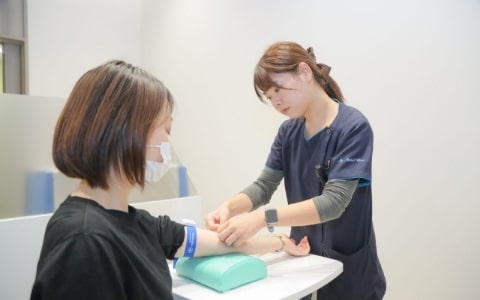
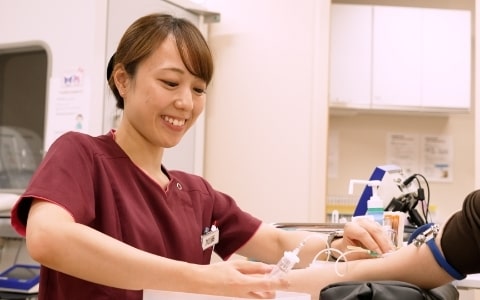
If any of the following apply to you, please tell the person in charge of blood sampling.
- · If you feel unwell when your blood is drawn
- · If you are allergic to disinfectant (alcohol) or gloves (latex, etc.)
- · If you are on hemodialysis
- · If you have had a mastectomy
- · If you have other wishes or concerns
Complications
Blood sampling is basically a safe procedure, but in rare cases, the following complications may occur.
Please be advised of this before you undergo hematologic tests.
- 〇 Subcutaneous haematoma
- May occur at the time of puncture or when hemostasis is insufficient.
Please apply pressure to the puncture wound for 3 to 5 minutes.
- 〇 Allergic reaction
- Alcohol disinfection or latex (rubber gloves) may cause allergic symptoms such as itching and rash.
Please tell the person in charge of blood sampling if you have experienced allergic symptoms in the past.
- 〇 Nerve injury
- At the time of puncture, you may experience numbness in the fingers or unusually severe pain, which may persist for a while.
Ordinary blood sampling is unlikely to damage large nerves, and these symptoms are usually temporary.
However, if such symptoms occur, blood sampling will be discontinued immediately, so please let us know.
- 〇 Vasovagal reflex
- This may be caused by tension, anxiety, or pain, resulting in sudden decrease in blood pressure and dizziness (lightheadedness) or loss of consciousness.
It is said to be more common in young people and women.
If any of these symptoms occur, you will be asked to lie down on a bed.
For patients who will receive gastric X-rays
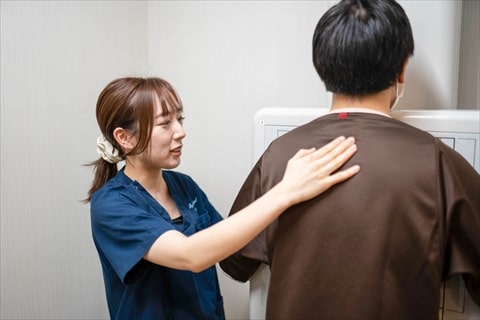
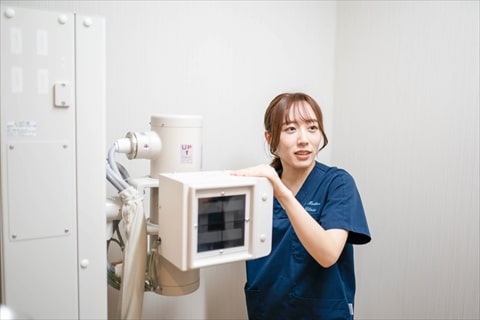
The purpose of the barium examination is “early detection of diseases such as stomach cancer, stomach ulcer, and chronic gastritis.”
Please pay attention to and cooperate with the following for a smooth examination and early detection of gastric diseases.
*Please note that if you arrive more than 30 minutes late for the barium examination without contacting us, the test will be cancelled.
*If you are scheduled for a gastric X-ray examination but do not wish to swallow barium, be sure to contact the clinic where you have an appointment by 2 weeks in advance.
For patients who have difficulty swallowing barium, we recommend switching to gastroscopy (5,500 yen including tax) or adding the ABC test to blood sampling (5,500 yen including tax).
Safety and accidental symptoms of gastric barium examination
According to the reports on accidental symptoms of gastric X-ray examination, the following may occur as side effects of barium ingestion: delayed defecation, hard stool (constipation), and risk of aspiration or peritonitis.
For constipation, administration of laxatives is considered to be effective.
It has been reported that aspiration is more common in men and the elderly, and that aspiration occurs in 0.17% of men and 0.08% of women aged 65 years or older.
Among 44 patients with perforation caused by barium peritonitis, 1 patient with perforation in the small intestine and 6 patients with perforation in the large intestine are reported to have died.
The effective dose per gastric X-ray at medical institutions is 3.7~4.9 mSv.
This amount of radiation exposure is not expected to affect your health.
If the test cannot be performed
表は横にスクロールします
| 疾患名 | 状態 | 可・不可 | ||
|---|---|---|---|---|
| 消化器疾患 | 上部消化管疾患 | 治療中 | × | |
| 炎症性腸疾患 | 治療中 | × | ||
| 大腸憩室 | 憩室炎あれば | × | ||
| 消化管手術の既往 | 術後1年以内 | × | ||
| 腸閉塞の既往 | × | |||
| 便秘 | 検査前72時間排便がなければ | × | ||
| 循環器疾患 | 虚血性心疾患 | 1年以内に発作あり | × | |
| 心不全 | 水分制限あり | × | ||
| 心血管系疾患手術の既往 | 術後1年以内 | × | ||
| 高血圧 | 180/110mmhg以上 | × | ||
| 呼吸器疾患 | 喘息 | 発作時治療中 | △ | |
| 慢性呼吸器疾患 | 在宅酸素療法 | × | ||
| 手術の既往 | 術後1年以内 | × | ||
| 脳血管障害 | 脳血管障害 | 1年以内の発作あり | × | |
| 頭部手術の既往 | 術後1年以内 | × | ||
| 認知症など | 理解困難あれば | × | ||
| てんかん | 1年以内に発作あり | × | ||
| 運動障害 | 麻痺・疼痛・筋力低下 | 体位保持・体位変換困難 | × | |
| 手術の既往 | 術後1年以内 | × | ||
| 椎体・靭帯の治療中 | 体位変換困難 | × | ||
| 体型・体形 | 体位変換困難、体重135kg以上 | × | ||
| 腎疾患 糖尿病 |
透析中 | × | ||
| 慢性腎疾患 | 水分制限あり | × | ||
| 糖尿病 | 当日朝治療薬使用した場合 | △ | ||
| その他 | 妊娠またはその可能性 | × | ||
| アレルギー(バリウム、発泡剤) | × | |||
| 体調不良 | × | |||
| 腹部手術の既往 | 術後1年以内 | × | ||
| メニエール病 | △ | |||
| 誤嚥 | バリウム誤嚥歴あり | △ | ||
| 食事 | 当日摂食 | × | ||
| 飲水 | 3時間前まで300ml以内 | ◯ | ||
| ペースメーカーやリブレなどの 医療機器装置 |
△ | |||
- ※1 当院医師の判断で最終的に検査を受けられるかどうか判断いたします。
- ※2 表に該当する方でも内視鏡で検査可能な場合がございますので、事前にお電話でご相談ください。
- ※3 その他上記記載がないものに関しても医師の判断にて検査が中止になる場合があります。
Precautions to follow, from the day before the test until after the test
- The day before the test
- Gastric X-ray examination cannot be performed with high accuracy if there is undigested food or gastric juice in the stomach.
Be sure to avoid eating for at least 7 hours before coming to the clinic.
(If you are also scheduled for blood tests, please avoid eating for at least 10 hours before blood sampling.)
⬧ Please avoid consuming the following on the day before your examination: fatty meat, fish, butter, fiber-rich vegetables, alcohol, and tobacco)
- On the day of the test
-
Eating and drinking are prohibited on the morning of your visit.
Please note that the test may be cancelled if insufficient time has elapsed since your last meal.
*If you are scheduled to receive your health examination in the afternoon, you should eat a light breakfast (rice gruel, toast, etc.) at least 7 hours before the scheduled time and refrain from eating and drinking thereafter.- · If your throat feels dry, you can rinse your mouth with water.
*There is no problem with brushing your teeth on the day of your visit. - · Even things like hard candies and caramels should be avoided on the day of the visit.
Also refrain from smoking.
*However, dehydration may occur in summer.
You may drink 300 mL of water or green tea at least 3 hours before the test. - · No tests will be performed if you are pregnant or could be pregnant.
If you are breastfeeding, the tests can be performed. - · Please note that patients who have difficulty understanding Japanese or simple English may not be allowed to proceed with testing.
- · If you have undergone gastrectomy or abdominal surgery or you are under treatment, hard of hearing, or have a physical disability, please be sure to tell the person in charge before the test because we may need to give care to the method of imaging and bear these in mind when interpreting the images.
- · Since constipation is likely to occur after the examination because of the effects of barium, you will be given some laxatives at the reception desk on the day of the examination.
If you often tend to be constipated, we will give you a larger amount of laxative, so please let us know.
- · If your throat feels dry, you can rinse your mouth with water.
- After the test
-
- · After the test, carefully read the instructions for the laxative and take it with a large amount of water.
- · If you have abdominal bloating and pain or you do not void the barium even 24 hours after taking additional laxative, consult our clinic or the nearest medical institution.
- · After the test, carefully read the instructions for the laxative and take it with a large amount of water.
For patients who will receive gastroscopy
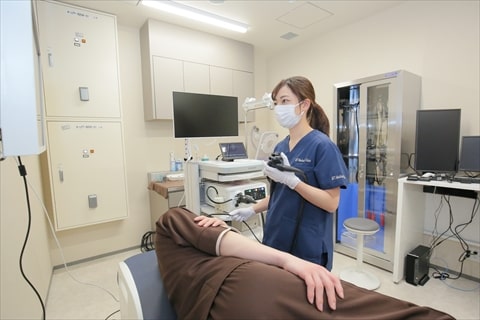

Gastroscopy is a test in which an endoscope is inserted through the mouth or nose to observe the esophagus, stomach, and duodenum.
In addition to simple observation, it is possible to dye or enlarge the lesion for detailed observation, and a tissue sample may be taken to perform a pathological examination (biopsy).
A biopsy may be performed if the doctor judges it necessary.
Before the test, you can choose whether to receive the endoscopy by the nasal route or oral route.
Even if you choose the nasal route, it may be necessary to switch to the oral route if you develop nose bleeding or the tube cannot be inserted.
If you wish, you can arrange in advance to undergo the examination with a sedative.
*If you wish to receive a sedative and you are breast-feeding, please let us know in advance.
Safety and accidental symptoms of gastroscopy
- ○ Adverse reactions to anesthetics, anticholinergics, etc.
Shock, respiratory depression, hypoglycemic symptoms, etc. may occur.
(Frequency: 0.006%)
Be sure to tell us if you have previously had problems with anesthetics or if you have prostatic hypertrophy, glaucoma, heart disease, hyperthyroidism, or diabetes. - ○ Perforation/hemorrhage from insertion of endoscope, hemorrhage after biopsy: Although the frequency is only about 0.012%, these adverse reactions require emergency procedures and may require surgery or hospitalization.
Please let us know in advance if you are taking a drug that prevents blood from clotting or you are prone to nosebleed or hemorrhage. - ○ Accidental symptoms of drip infusion: When anesthesia is used, a drip infusion is required.
The insertion site may become swollen or blue, but it will disappear spontaneously in about 2 weeks. - ○ The insertion site may be disinfected after the test, or blood tests for infection (hepatitis B, C, and syphilis) may be performed in advance to ensure proper handling.
The results will be handled in strict compliance with the Personal Information Protection Law. - ○ The throat will be anesthetized before the test.
Please let us know in advance if you have ever felt ill due to surgery, treatment for injury, or dental anesthesia.
(From the Japan Gastroenterological Endoscopy Society’s 1998~2002 nationwide survey)
Precautions to follow, from the day before the test until after the test
- The day before the test
- You must finish dinner by 7 hours before the scheduled time of your health examination and must not eat anything thereafter.
A light dinner is recommended.
You may drink liquids such as green tea.
Avoid alcohol.
If you usually take medicine after dinner or before bedtime, take it as usual.
- On the day of the test
- If you are scheduled to come to the clinic in the morning, you will be prohibited from eating in the morning.
Please note that the test may be cancelled if insufficient time has elapsed since your last meal.
You may drink a minimal amount of uncolored fluid until 2 hours before the start of the test.
*If you are scheduled to undergo your test in the afternoon, you should eat a light breakfast (rice gruel, toast, etc.) at least 7 hours before the scheduled time and refrain from eating and drinking thereafter.
If you take medicine for hypertension or heart disease every morning, take it with a glass of water when you wake up in the morning (approximately 7:00 a.m.).
If you have diabetes mellitus and you self-inject insulin or take hypoglycemic drugs, you will need to refrain from doing so on the test day because you will be fasting.
(If your test is scheduled for the afternoon, inject or orally take the drug with food 7 hours before the test.
*If hypoglycemic symptoms occur, take glucose to alleviate the symptoms. )
Remove removable dentures in advance.
It is fine to undergo the test with implants or other irremovable fixtures.
Please note that some waiting time may occur depending on the situation on the day of the test.
- After the test
- Do not eat or drink anything until 1 hour after the end of the test because anesthesia remains in the throat.
After 1 hour has passed, take a sip of water. If you can swallow it without choking, you may resume meals.
*If a biopsy is performed, may resume eating and drinking 2 hours after the end of the test.
The nurse will explain the details after the end of the test.
If you received the test by the nasal route, you may experience nosebleed, so please do not blow your nose forcefully.
You may experience nosebleed or sore throat for several days as a result of the test, but it will disappear spontaneously.
If a sedative was used, you should not drive a car, motorcycle, or bicycle after the test.
For patients who will receive colonoscopy
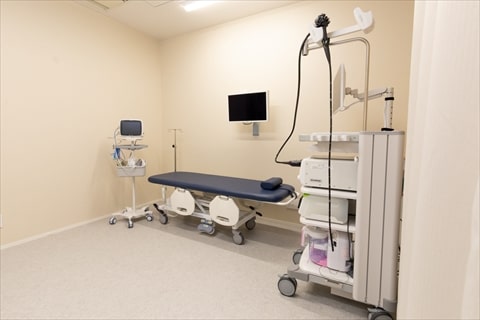
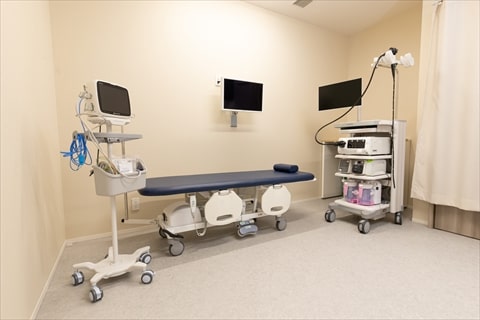
Colonoscopy is a test in which an endoscope is inserted through the anus to observe the large intestine and part of the small intestine.
If necessary, a part of the lesion or a small polyp may be resected for histological examination (biopsy).
At our clinic, colonoscopy is performed under sedation to reduce pain and anxiety during the test.
Safety and accidental symptoms of colonoscopy
- [1] Bleeding, damage to the gastrointestinal tract, or holes caused by endoscopy or histological examination
- [2] Injection site inflammation, subcutaneous hemorrhage, muscle disorder, nerve disorder, phlebitis, blood pressure decreased, shock, respiratory depression, respiratory arrest, drug eruption, nausea/vomiting, etc. due to administration of sedatives
According to the Japan Gastroenterological Endoscopy Society, colonoscopy was reported to be accompanied by accidental symptoms in about 0.012% of cases from 2003 to 2007.
There have also been very rare reports of death.
The mortality rate due to complications related to sedation/analgesics is considered to be approximately 1 in 3.3 million patients.
Precautions to follow, from the day before the test until after the test
- The day before the test
- You must finish dinner by 20:00 and take the laxative by 21:00.
*A low-residue food set (Clearthrough JB3 Food Set) to be consumed for breakfast, lunch, and dinner on the day before the test is available as an option if you wish.
- On the day of the test
- You must refrain from eating on the day of the test.
You may drink water.
If you usually take blood pressure, heart, or asthma medication, etc., please take it at 6:00 a.m.
How to take the laxative (on the day of the test)
Start to take Moviprep 2 hours before the test (Combine with 2 L of water to make 2000 mL of bowel cleansing agent).
*Moviprep will be given to you at the clinic on the day of the test.
In the following, 1 cup is about 180 mL. Alternate between drinking:
[1] 2 cups of Moviprep, and
[2] 1 cup of water or green tea.
It should take you about 20 to 30 minutes to consume each course of [1] + [2]. Continue to alternate between drinking Moviprep and water or tea until your stool is clear and free of solid matter.
Please note that some waiting time may occur depending on the situation on the day of the test.
- After the test
- If a sedative was used in the test, please refrain from driving a car, motorcycle, or bicycle on the day of the test.
If a tissue sample was collected, please refrain from drinking alcohol or eating stimulating foods on the day of the test and the day after.
You should also rest as much as possible.
For patients who will receive cervical cytology
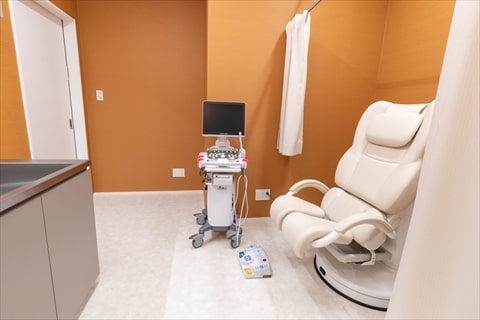
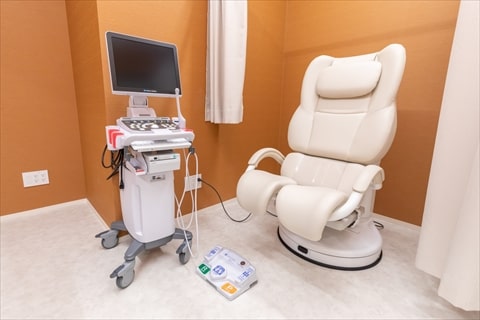
If you have your period (particularly on the 2nd day, when menstrual flow is heavy), the results may not be accurately reflected, so it is recommended that the test be postponed to a later date.
Please let us know in advance.
■ For women who have never experienced sexual intercourse
In most cases, cervical cancer is caused by sexual intercourse.
Cervical cytology is painful if you have never experienced sexual intercourse, and the probability that there will be no abnormality is 99%. Please make your own decision as to whether or not to undergo the test.
However, since women aged 30 years or older may have gynecological diseases other than cervical cancer, it is recommended that you receive ultrasonography, etc. once.
About optional tests
The accuracy of cervical cytology is increased when it is combined with an HPV test and transvaginal ultrasonography.
You can add optional tests on the day of examination, so please let us know if you wish to do so.
Please urinate before receiving transvaginal ultrasonography.
| Optional tests | Prices (tax included) |
|---|---|
| HPV test | 5,500 yen |
| Transvaginal ultrasonography | 4,400 yen |
For patients who will receive mammography
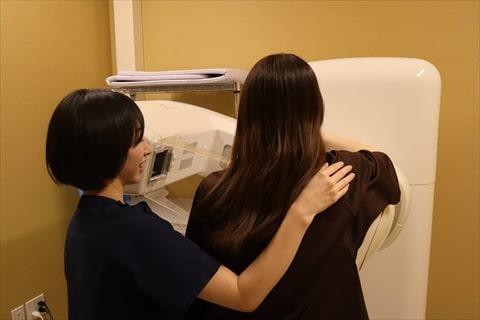
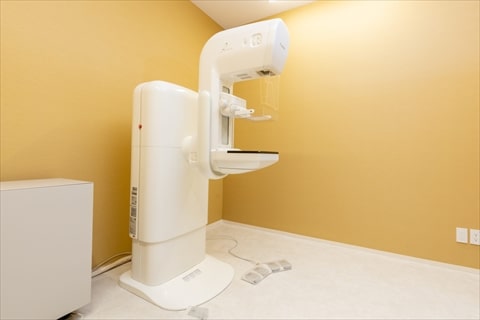
Mammography is performed for early detection of microcalcification, which is one of the initial symptoms of lumps, tumors, and cancers that are difficult to detect.
Periodic mammograms make early detection and treatment of breast cancer possible.
On the other hand, you will be exposed to a small amount of radiation because of the use of X-rays.
(Mean breast dose 2.4 mGy)
Since imaging is performed with breast compression, mammography may cause pain.
Advantages and disadvantages of the test
Periodic mammograms make early detection and treatment of breast cancer possible.
On the other hand, you will be exposed to a small amount of radiation because of the use of X-rays.
(Mean breast dose 2.4 mGy)
Since imaging is performed with breast compression, mammography may cause pain.
What to expect on the day of the test
The breast is sandwiched between plastic plates and compressed.
Pain associated with mammography varies among individuals.
(Pain also differs somewhat depending on whether or not you have your menstrual period.)
If you are not feeling well, the strong compression and tension can cause fainting.
Patients who cannot undergo mammography
- · Patients who are pregnant or could be pregnant
- · Patients with a pacemaker, implantable cardioverter defibrillator (ICD), or a shunt port
- · Patients who have recently undergone breast augmentation surgery or other breast surgery
Please confirm consultation hours and access for each hospital below.



